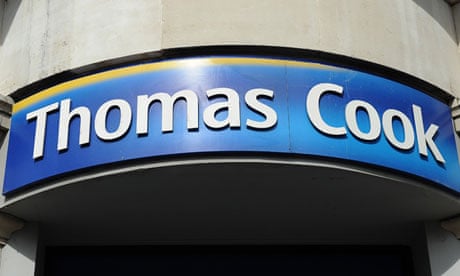A disastrous year for Thomas Cook has been laid bare as the travel company revealed that losses increased to £485m in a period in which the business nearly collapsed and its chief executive resigned.
The company suffered from higher fuel costs, lower passenger numbers and civil unrest at some of its most popular destinations, resulting in 1,250 redundancies.
It also made a loss on its sponsorship as the official travel operator of the London Olympics – the latest in a long line of companies to suffer at the hands of the Games.
But new boss Harriet Green, who was drafted in four months ago from electronics firm Premier Farnell, said she believed the "unacceptable" losses could be reversed and has uncovered savings of £100m within three years.
She added that nearly 80% of staff in top level positions had left their jobs as she implemented a widespread overhaul of the business, which was forced to breach its banking covenants or risk collapse.
Green said: "These results reflect the major issues that Thomas Cook faced last year, but they mask the material improvement that we made in the fourth quarter.
"Last year represents a trough that can only be improved. We need to build a much more effective organisation and that's why two-thirds of top leaders have changed."
She also warned Thomas Cook could suffer unless the government introduced a regional strategy for the future of the airline industry.
"I believe we need a truly regional strategy in aviation and need to make sure facilities across the country, whether in Bristol, Birmingham, Newcastle or London, are maintained properly."
Closer to home, the key to Thomas Cook's success is reducing its debt mountain, which fell £108m to £788m in the last year.
In May, bosses were forced to ask its lenders to extend loans by three years and secured a £1.4bn refinancing package that threatened the 171-year-old firm's future. It followed an emergency £200m bailout loan a year ago.
The group's UK plane fleet was reduced by six this year to 35 and 149 high street stores have closed along with five head office buildings, resulting in 1,250 job losses.
Higher fuel and hotel costs hit UK profits by £62m, while bosses estimate they lost £30m from negative publicity after the company's near-collapse at a time when several smaller firms had failed, leaving holidaymakers stranded abroad.
Hopes of cashing in on the Olympics were also left in tatters, as the company revealed it made an overall loss of £17.2m from a deal that management described as "onerous".
Thomas Cook sold ticket and accommodation packages exclusively and made a trading profit of £9.6m on the deals. However, the business made a loss after the huge cost of buying the licence from organisers.
However, Green, who replaced Manny Fontenla-Novoa in July, believes she can turn around the struggling company.
She said: "Thomas Cook is not broken. It is viable and working. It is an iconic brand and we have a lot to do but we are starting a new chapter."
Green is planning to focus on improving the company's website and looking at cost-cutting measures that could include further redundancies. She will announce her overhaul plans fully in the spring.

Comments (…)
Sign in or create your Guardian account to join the discussion